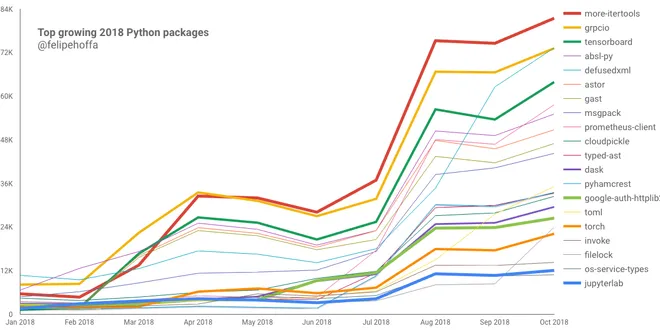PyPI

How to publish a project into PyPI
The Python Package Index (or PyPI) is a repository of software to Python and one of the properties that makes it so powerful. With just a simple command, you can access thousand of libraries.
📚 Read more at Python in Plain English🔎 Find similar documents

Publishing Open-Source Python Packages to PyPI
The Python Package Index is a repository of software libraries available for Python programming. PyPI makes it easy to distribute and access useful projects that are not a part of the standard Python…...
📚 Read more at Towards Data Science🔎 Find similar documents

The Most Complete Guide for Creating a Good PyPI Package
PyPI is the official software repository for Python packages. This guide contains recommendations that will make your PyPI upload more successful.
📚 Read more at Towards Data Science🔎 Find similar documents

Getting Started with Pip and PyPI in Python
Python’s package manager is called pip, and it comes bundled with every recent version of Python. pip allows us to install packages that don’t come bundled with the Python standard library. By default...
📚 Read more at Real Python🔎 Find similar documents

Planning Python Package Structure for Publishing to PyPI
PyPI is the public hosting service where open-source Python packages live. When you pip install a package, that’s where it fetches it from. In this video, you’ll learn all about the structures of a pa...
📚 Read more at Real Python🔎 Find similar documents

Tips for Publishing Python packages on PyPI
For open-source Python developers, publishing packages on PyPI is an essential activity. PyPI is quite easy to use. However, there are some gotchas that can make life a bit difficult for beginners…
📚 Read more at Python in Plain English🔎 Find similar documents

Private PyPI Server on Kubernetes
Most of us would have used the public PyPI registry to install popular Python libraries. However, developers might need to host their own Python packages for personal projects or across one's…
📚 Read more at Python in Plain English🔎 Find similar documents

How To Upload a Repository on PyPI and GitHub
Installing PyPI packages made easy Photo by Richy Great on Unsplash Introduction As a graduate student dealing with vast amounts of data, coding for automation is essential for higher efficiency. Thi...
📚 Read more at Better Programming🔎 Find similar documents

Modules and packages in Python
PyPi is a repository for open-source third-party Python packages. There are many other libraries that are open-sourced and shared on PyPi. The “pip install” command is used to install these packages…
📚 Read more at Level Up Coding🔎 Find similar documents

PyPI vs Warehouse, the Next-Generation Python Package Repository
► Free 5-day class on Python Dependency Management: https://dbader.org/python-dependency-pitfalls In this video we'll compare the PyPI package repository with its successor called "Warehouse." Warehou...
📚 Read more at Real Python🔎 Find similar documents

Library of the week #2: Pypinfo
Why Pypinfo? Pypinfo is the library I use to display the statistics about how many downloads (in the past month) a python library has had on PyPi . If you need a quick and convenient access (like I do...
📚 Read more at Python in Plain English🔎 Find similar documents

Python PyPI stats in BigQuery: Reclustered
The Python Software Foundation provides raw metadata for every download from the Python Package Index— including activity from pip install. Now anyone can use their free monthly terabyte of BigQuery…
📚 Read more at Towards Data Science🔎 Find similar documents


